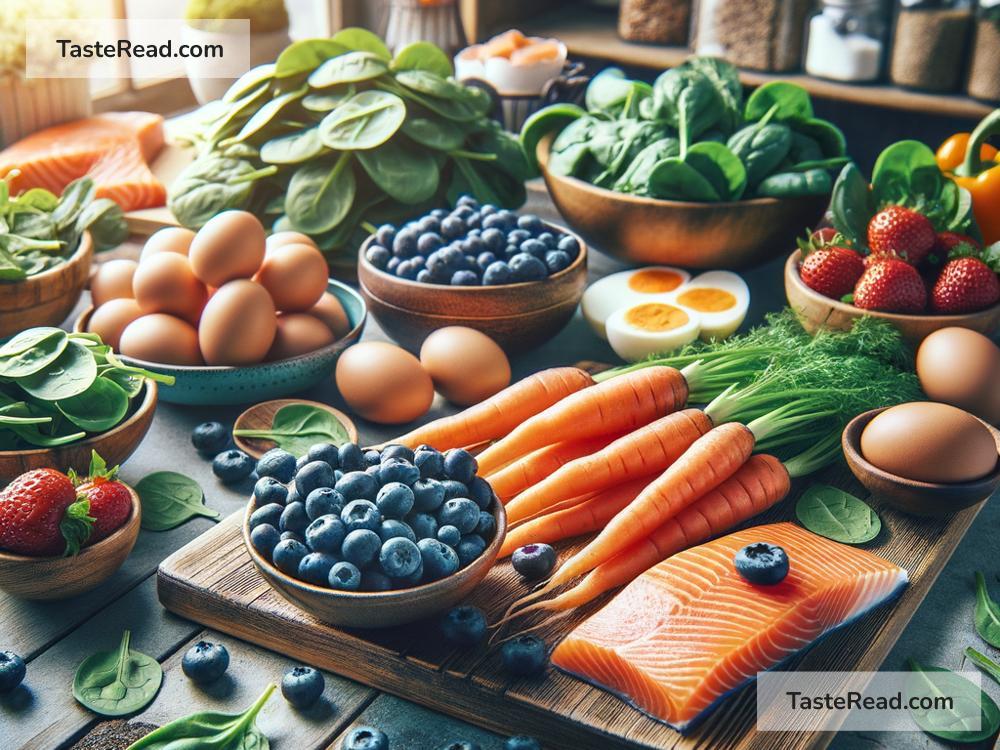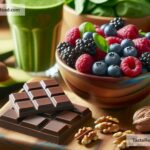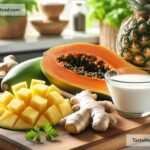Foods That Improve Depth Perception: Eat Your Way to Better Vision!
Depth perception plays a crucial role in how we interact with the world around us. It allows us to judge distances and see objects in three dimensions. Whether you’re driving, playing sports, or simply walking around, depth perception helps you stay safe and navigate your environment. While many factors influence depth perception, including age and eye health, your diet can also play a big role. Eating certain foods can support your vision and improve depth perception by keeping your eyes healthy and functioning at their best.
In this blog, we’ll explore foods that are known to boost eye health and improve depth perception. The best part? These foods are delicious, nutrient-packed, and easy to include in your diet!
Why Diet Matters for Depth Perception
Depth perception relies on healthy eyes and a well-functioning brain. Your eyes depend on specific nutrients to stay sharp and responsive. For example, the retina (the part of the eye that detects light and sends signals to the brain) needs vitamins and antioxidants to work properly. By eating the right foods, you can feed your eyes the nutrients they need to stay strong, reduce the risk of eye diseases, and improve overall vision quality—including depth perception.
1. Carrots: The Vision Superhero
Carrots have long been known for their eye health benefits—and for good reason! They’re packed with beta-carotene, a type of vitamin A that helps maintain a healthy retina. Since the retina plays a direct role in depth perception, eating foods with beta-carotene can help your eyes process light effectively, making it easier to judge distances and see objects clearly.
Snack on raw carrots, add them to salads, or toss them into soups for an easy eye-health boost.
2. Dark Leafy Greens: Nutrient Powerhouses
Vegetables like spinach, kale, and collard greens are rich in lutein and zeaxanthin, antioxidants that protect your eyes from harmful UV rays and blue light. These nutrients boost the macula, a small central part of your retina responsible for detailed vision and depth perception. Consuming dark leafy greens regularly may even prevent age-related macular degeneration, a condition that can reduce depth perception.
Blend spinach into a smoothie, sauté kale as a side dish, or add greens to your favorite pasta recipe—your eyes will thank you!
3. Fish: Omega-3 Goodness
Fatty fish such as salmon, mackerel, and sardines are high in omega-3 fatty acids, which are vital for overall eye health. Omega-3s help reduce eye dryness and improve communication between your eyes and brain. Better communication means smoother processing of visual cues, which can enhance depth perception.
If you’re not a fan of fish, try taking fish oil supplements or eating plant-based sources of omega-3s like chia seeds and walnuts.
4. Eggs: Strength for Your Retina
Eggs are another food packed with lutein and zeaxanthin, along with zinc, a mineral that supports the retina and helps improve vision clarity. Zinc is crucial for helping your eyes adapt to different lighting conditions, which is important for depth perception. Eggs are also loaded with protein, making them an excellent option for a hearty breakfast.
Enjoy hard-boiled eggs as a snack, make a veggie-packed omelet, or whip up some egg salad for lunch.
5. Citrus Fruits: Vitamin C for Bright Eyes
Oranges, grapefruits, lemons, and other citrus fruits are loaded with vitamin C, an antioxidant that protects the blood vessels in your eyes and reduces the risk of cataracts. Strong blood vessels ensure that oxygen and nutrients reach your eyes, helping your retina perform at its best. This can result in sharper vision and improved depth perception.
Start your day with a glass of orange juice, snack on an easy-to-peel mandarin, or add lemon slices to your water.
6. Sweet Potatoes: A Beta-Carotene Boost
Sweet potatoes are another tasty source of beta-carotene, much like carrots. They help keep your retina healthy and give your eyes the fuel they need to process images effectively. Sweet potatoes are also rich in vitamin E, another antioxidant that combats damage to your eye cells.
Bake a sweet potato as a side dish, mash it into a puree, or cut it into fries for a healthier twist on a well-loved snack.
7. Nuts and Seeds: Tiny Nutritional Powerhouses
Nuts like almonds, walnuts, and seeds such as sunflower seeds are rich in vitamin E. This vitamin protects eyes from oxidative stress, which can damage the retina over time. Clearer, healthier retinas mean improved depth perception.
Pack a handful of almonds for your next road trip, sprinkle sunflower seeds over your salad, or blend walnuts into your smoothie.
8. Blueberries: Antioxidant Boosters
Blueberries are loaded with antioxidants that reduce inflammation and strengthen blood vessels in your eyes. They can help improve night vision and depth perception by keeping your eyes healthy and responsive.
Snack on fresh blueberries, toss them into yogurt, or bake them into muffins for a healthy treat.
Conclusion: Eat Your Way to Better Vision
Improving depth perception doesn’t just depend on expensive gadgets or therapies. The food you eat plays a significant role in keeping your eyes healthy and your vision sharp. By including carrots, leafy greens, fish, eggs, citrus fruits, sweet potatoes, nuts, seeds, and blueberries in your diet, you can give your eyes the nutrients they need to perform their best.
So, why wait? Start incorporating these eye-friendly foods into your meals today, and see the world with greater clarity and depth. Good vision begins in the kitchen!


